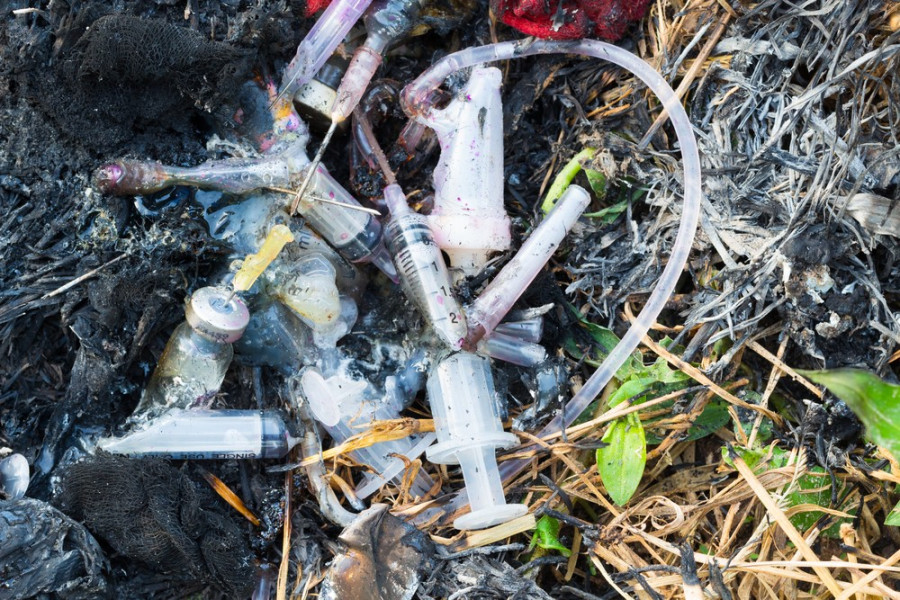Health
Unmanaged hazardous hospital waste is a cause for concern in Capital
The city authority recently penalised five state-run hospitals and some private-run hospitals for disposing of hazardous hospital waste alongside household waste.
Arjun Poudel
Seti Maya Chamini, a sanitation worker at the Kathmandu Metropolitan City, cleaned the city roads for four decades.
Months before her retirement, during her usual morning shift, she got her fingers pricked by a needle while collecting waste. As the burning sensation grew, she went to a hospital. Doctors at the hospital informed her that two of her fingers had developed an infection and that they needed to be amputated if they were to save her hand.
Doctors believed the infection was from a used syringe, one of the hazardous hospital wastes.
There are around 900 workers in the department. Like Chamini, several other staff working at the environmental department of the metropolitan city, have been infected by hazardous needles used in health facilities—hospitals, nursing homes, polyclinics, laboratories and others.
“Some cut their hands on broken glasses which leads to infections, others get tetanus through used syringes,” Balaram Ranabhat, who drives the city office’s garbage trucks, told the Post. “No one seems to be concerned about the problems we face.”
Hospital waste management is an important but neglected issue in Kathmandu. Due to the apathy of the authorities to enforce rules for hospital waste management, cleaning staff working under the environment department of the metropolis have been risking their health and sometimes their lives at their jobs.
A few weeks ago, the metropolis penalised five state-run hospitals and some private-run hospitals for disposing of hazardous hospital waste alongside household waste.
Paropakar Maternity Hospital, Thapathali, Sukraraj Tropical and Infectious Disease Hospital, Teku Hospital, Nepal Army Hospital, and TB Hospital, Kalimati were among the hospitals that were fined for disposing of infectious hospital generated waste, according to the environment department of the metropolis.
“We fined those hospitals with a penalty of up to Rs 15,000 and warned them against repeating such mistakes,” Sarkardeep Shrestha, an official at the department told the Post. “We found blood samples and other laboratory waste in the garbage sent for disposal at the Sisdole landfill site.”
Likewise, the department had fined Rs 80,000 to some private hospitals in February for discarding hazardous waste mixed up with municipal waste, according to Surya KC, a metropolis official working under the same department.
The hospitals, which were fined for disposing of hazardous waste mixed with municipal waste, are leading central level hospitals, which do not have their own waste disposal system. Other government hospitals as well as private hospitals in Kathmandu Valley also dispose of their hazardous waste in the same manner. In addition, most of the private hospitals, nursing homes, poly clinics and laboratories in Kathmandu Valley also adopt such dangerous waste disposal practices.
Dr Basudev Pandey, director at the Sukraraj Tropical and Infectious Disease Hospital, said that the hospital cleaning staff, more often than not, mix up hazardous waste with non hazardous waste, despite the hospital administration’s strict instructions to not do so.
“Mixing up hospital waste with household waste poses serious threat of spread of infections-HIV, Hepatitis B, Hepatitis C, tuberculosis and tetanus-to those who handle the waste,” said Pandey. “But we have instructed our staff to autoclave the needles before discarding them and separate the hazardous waste at source.”
Over 1,000 private health facilities have taken approval to operate in Kathmandu Valley. The Provincial Health Office in Kathmandu estimated that an equal number of such health facilities might be operating without a licence. “We ask them to autoclave hazardous waste,” Indira Pandey, public health inspector serving at the office told the Post. “But since some private clinics work without a licence, we don’t know whether they are following our instructions or not.”
The monitoring of waste management of health facilities also falls under the jurisdiction of the Provincial Health Office but due to the lack of human resource and budget, the office has not been monitoring health facilities for the last two years.
“We have signed an agreement with the Kathmandu Metropolitan City for waste management,” Rup Narayan Khatiwada, chief of administration at the Sukraraj Tropical and Infectious Disease Hospital, told the Post. “We regularly pay them for collecting our waste.”
He concedes that the Environment Department of the metropolis had fined the hospital for mixing up the hazardous waste with other waste.
According to Khatiwada, the metropolis has placed a garbage container at the Sukraraj Hospital premises, where the cleaning staff dispose of the waste generated in hospital wards, laboratories and other areas.
However, adding chaos to this confusion are rag pickers and drug abusers who enter the hospital premises in search of discarded medical refuge-empty saline bottles, blood bags, used syringes and others.
Khatiwada said that his hospital has filed an application at the Metropolitan Police Range, Ranipokhari, to establish a police beat on the hospital premises to ward off drug users and rag pickers as a precaution to control the spread of infectious diseases among them.




 21.12°C Kathmandu
21.12°C Kathmandu















